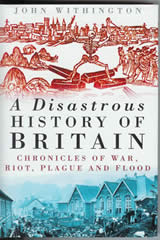What was the worst plague to hit Britain and Devon? The Black Death, cholera, Spanish flu, covıd? And what can we learn from the diseases of the past about how we should deal with the coronavirus pandemic? I was lucky enough to discuss all this and more with Pippa Quelch on BBC Radio Devon.
How the Black Death killed nearly half the clergy in parts of Devon, how the authorities in Exeter took the right approach to cholera even though no one knew what was causing it, and how one Devon medical officer warned women that low-cut tops and thin stockings were spreading Spanish flu.
You and hear it here -
https://www.bbc.co.uk/sounds/play/p0bf7sld
And learn more from my book A Disastrous History of Britain https://www.amazon.co.uk/Disastrous-History-Britain-Chronicles-Plague/dp/075093865X/ref=sr_1_3?crid=WCY5DXBCGGAD&keywords=a+disastrous+history+of+britain&qid=1642507048&sprefix=a+disastrous+history+of+britain%2Caps%2C209&sr=8-3










